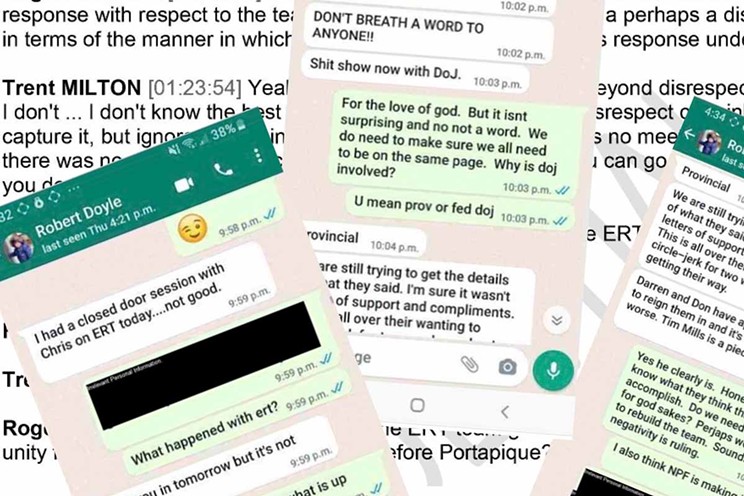Say what you like about the Mass Casualty Commission—call it expensive, disrespectful or a let down—you can’t deny there’s a lot to read on the commission website. And at the end of October, another 2,000 or so documents were made public, adding to the pile of statements, decisions, transcripts, foundational documents and such related to the April 2020 shooting rampage that started in tiny Portapique, NS. “Our hope is that you will review the documents of interest to you in the coming weeks and months,” says the MCC’s announcement about the new information. Yesterday, a memo found in the documents made news because of what it said about the RCMP shooting up the Onslow fire hall during the hunt for the killer. Here, The Coast is sharing some texts and WhatsApp messages we found that show the disdain RCMP leaders had for their officers. To explore the documents yourself, start with the search bar under the Source Materials and Additional Exhibits section on this page.
The texts The Coast found relate to how RCMP brass dealt with the RCMP’s Emergency Response Teams in the days and weeks after the shootings. An ERT is a specialized tactical unit inside the RCMP; there’s an ERT in what the Mounties call H-Division—that’s Nova Scotia—and another in J-Division, New Brunswick. The MCC’s foundational document about ERTs explains that both of these emergency response teams were sent out to “the emerging incident in Portapique” with a mission to “locate and arrest active shooter/murder gunman.”
Nova Scotia’s ERT was deployed Saturday night, April 18, 2020, after the shooting started, and the New Brunswick ERT was brought in early Sunday morning as reinforcement. The gunman was shot and killed by an ERT member and another RCMP officer at a gas station shortly before noon Sunday, after he had killed 22 people, including RCMP constable Heidi Stevenson.
These events have been widely reported by media and minutely detailed by the casualty commission. So too have officers' allegations of being treated poorly by RCMP leadership. Cpl. Tim Mils, then-leader of the H-Division ERT, and his teammate, constable Trent Milton, spoke both publicly and privately to the commission. Mills gave an interview in the MCC’s Halifax boardroom on Sept. 1, 2021, and Milton was interviewed at NS RCMP headquarters in Dartmouth on Oct. 6, 2021. They also testified publicly on May 16, 2022. The consistent message coming from all this testimony is that police on the scene faced traumatic events during the shooting weekend, and RCMP leadership didn’t support them afterwards.
Reading their testimony, it's impossible not to believe the officers. But the text messages prove the leadership's disdain.
At the time of the shootings, the H-Division ERT was made up of 13 members: Five assigned to the team full-time, including Mills and Milton, the other eight part-time. “The part-time members were each posted to a regular RCMP detachment and performed regular policing duties three weeks per month,” the MCC’s ERT foundational document says. “The fourth week of every month they would spend engaging in ERT training with the full-time members. Both full-time and part-time members would respond to call-outs when available, including while part-time members were on shift at their detachment, with the permission of their supervisors.” All 13 members of the ERT responded to the Portapique scene.
But very soon afterwards, the distinction between part-time members and full-timers became a massive bone of contention. Mills and Milton wanted all 13 members of the team to be together for two weeks to grapple with what they’d gone through, rather than having the eight ERT part-timers sent to their various detachments across the province. This request was based on best-practice training. As Milton explained to the commission, just the month before Portapique he’d gone on a SWAT Team Leader Development Course with an instructor who had responded to the Columbine High School mass shooting in the US, among other “large-scale events.” The lesson, Milton said, was “our guys needed to be together in this time to kind of help heal from the mental trauma that they had just been through.”
Team leader Mills described to the commission being in a “psych debrief” with other officers and three psychologists: The H-Division’s psychologist Anna Nagy, the division’s former psychologist Margaret Grant and Dr. Joanna Kayfitz, a civilian. “So, you know, they ... everyone says their piece. Yeah, there were emotions spilling over and you know, like, it was hard. And then, you know, they're giving their ... their recommendations, things like, you know, we recommend, you know, you don't go sit at home drinking or, you know, keep busy, be around like-minded people, blah, blah, blah, blah, blah,” Mills said. “And I’m like, perfect. Good segue to my recommendation.
“I said, ‘A couple part . . . you know, part-timers saying it's going to be hard to go back to work tomorrow morning, hand out COVID tickets because you're within six feet or something stupid like that. We've been through war. They're looking for two weeks to decompress, come in here, I've got enough work for them.”
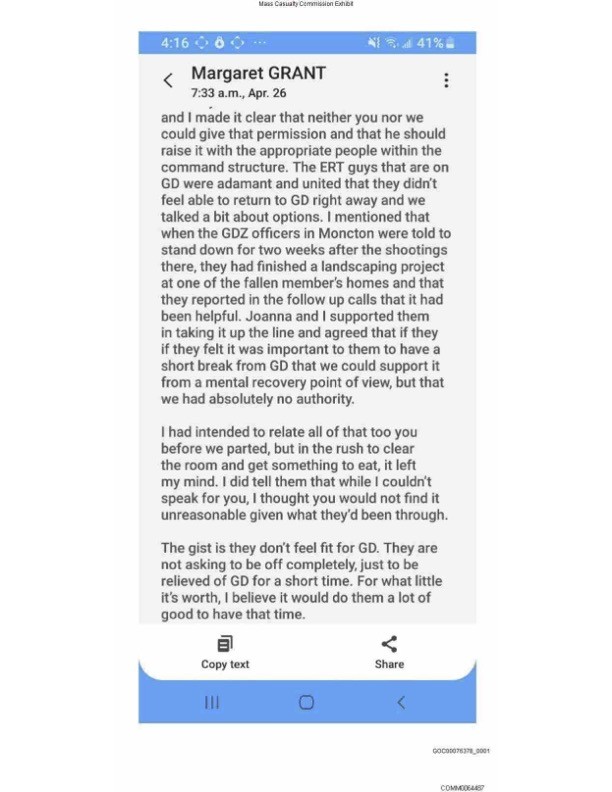
The psychologists agreed. On Sunday, April 26, one week after the shootings, Nagy and Grant texted about the request, making clear that the officers were looking for a break from GD, general duties, but not a vacation. “The ERT guys that are on GD were adamant and united that they didn’t feel able to return to GD right away and we talked a bit about options,” Grant writes. “Joanna and I supported them in taking it up the line and agreed that if they if they felt it was important to them to have a short break from GD that we could support it from a mental recovery point of view.”
The text, pictured above, concludes: “They are not asking to be off completely, just to be relieved of GD for a short time. For what little it’s worth, I believe it would do them a lot of good to have that time.”
Supported by the psychologists, the request to bring the part-timers from their detachments to headquarters was submitted up the chain of command. “We took it back to our senior management,” Milton said. But management refused the request, saying officers who needed time off could take sick days on their own.
“And so, it was kind of a huge jab at our members that you're telling me that you're not going to support me to have this mental health coping strategy, you're telling me I now need to go home and sit in my basement by myself and try to cope with this by myself,” Milton testified. “So, it turned into a little bit of a back and forth, and a lot of our members ended up going off duty because they were basically, ‘Fuck it, I'm . . . you don't want to help me. I'm not coming to work. You figure how you're going to deal with the critical incident that's coming in tonight.’”
Thanks to messages that are now on the commission’s site, some of the context of that “back and forth” over a couple of weeks can be revealed. RCMP superintendent Robert Doyle had two WhatsApp conversations with at least one unidentified person who is clearly in the senior-management RCMP loop, and in this ostensibly private forum, Doyle let his true feelings show.
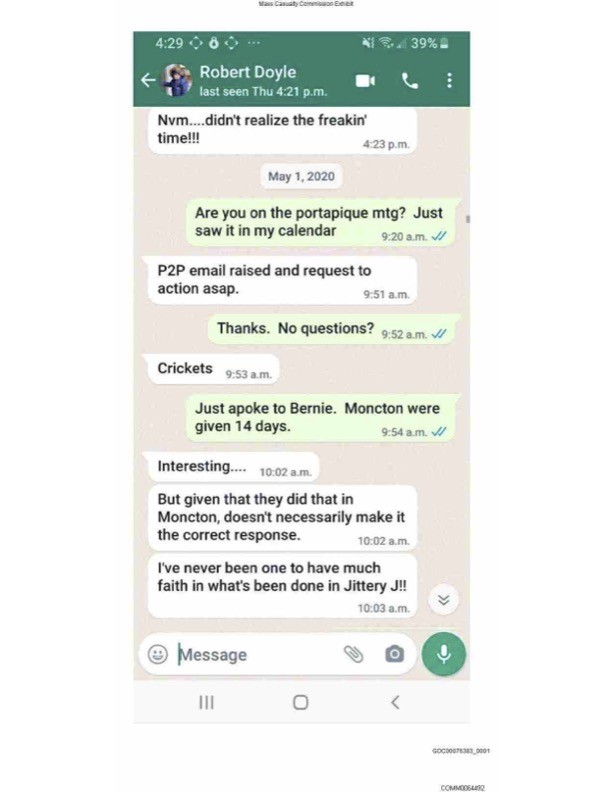
The first conversation, seen above and in a document on the commission’s website titled “COMM0064492 WhatsApp message exchange (5/1/2020),” happened May 1. In it, the unknown person seems to have gotten information about the way J-Division—New Brunswick RCMP—dealt with its officers coming back to work after trauma. “Just spoke to Bernie,” the person types. “Moncton were given 14 days.” It’s unclear whether that’s members of the J-Division ERT who were deployed to Portapique, or officers who survived the Moncton shooting in 2014, although the distinction doesn’t really matter: New Brunswick gave two weeks of relief, and superintendent Doyle was not impressed.
“But given that they did that in Moncton, doesn’t necessarily make it the correct response,” Doyle types. Then he sends another message, a sweeping denouncement of his New Brunswick colleagues. “I’ve never been one to have much faith in what’s been done in Jittery J!!”
More than a week goes by before we see Doyle again heap scorn on RCMP officers, again with an unknown correspondent.
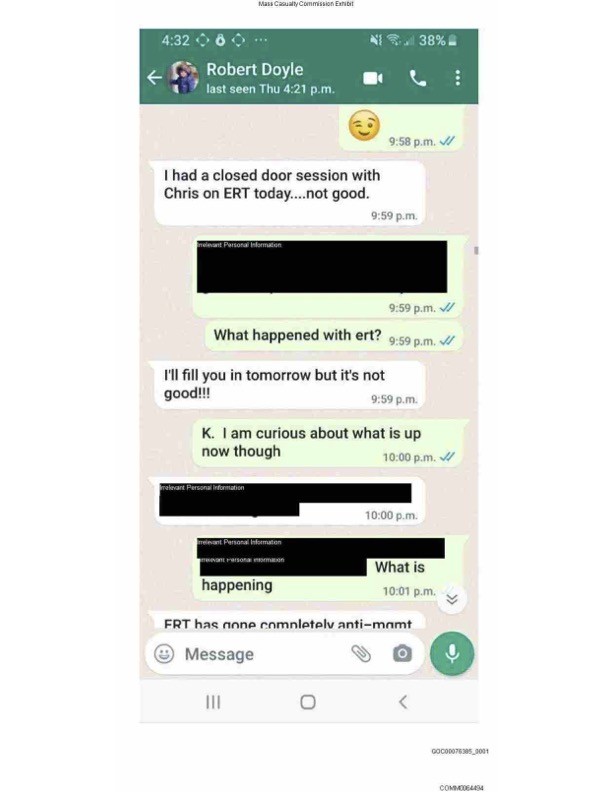
The first screenshot of the May 12 exchange—seen above and catalogued by the commission as “COMM0064494 WhatsApp message exchange (5/12/2020)”—is heavily redacted, but Doyle shares that “I had a closed door session with Chris on ERT today….not good.” Superintendent Doyle is presumably talking about his superior, RCMP chief superintendent Chris Leather.
The conversation continues on exhibit “COMM0064495 WhatsApp message exchange (5/12/2020),” below. Doyle sees the response team’s stance on therapeutic bonding more as a labour-versus-management issue than a proven mental health solution. “ERT has gone completely anti-mgmt. Wives have written the Prov Minister of Justice,” Doyle writes. In the next message, he warns “DON’T BREATH A WORD TO ANYONE!!” Then he says it’s a “Shit show” with the Department of Justice.
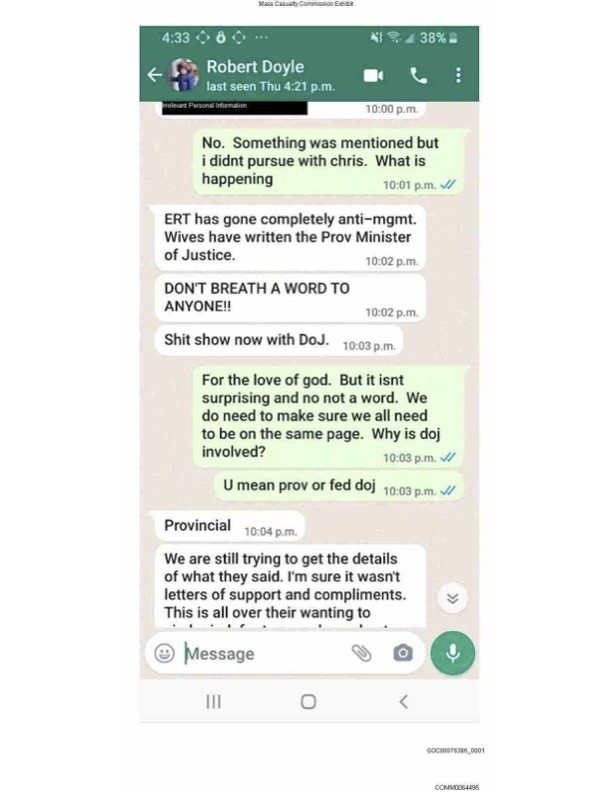
“For the love of god,” Doyle’s text buddy responds. “But it isn’t surprising and no not a word. We do need to make sure we all need to be on the same page. Why is doj involved?”
“We are still trying to get the details of what they said,” Doyle replies. “I’m sure it wasn’t letters of support and compliments.” This message carries on to a third screenshot, below, “COMM0064496 WhatsApp message exchange (5/12/2020).”
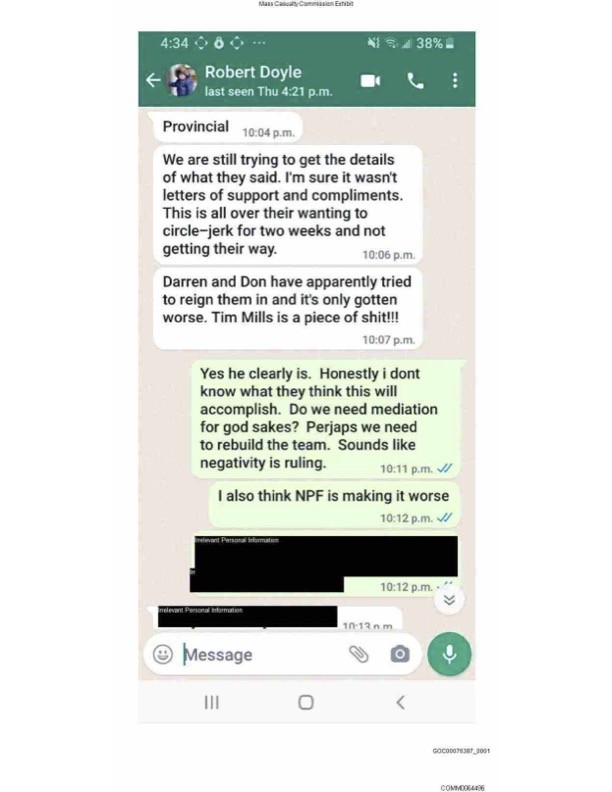
“This is all over their wanting to circle-jerk for two weeks and not getting their way.”
The Mass Casualty Commission has taken pains to be a “trauma-informed” process. An RCMP boss describing officers’ legitimate request to work together through a horrifying experience as a “circle-jerk” is profoundly trauma-misinformed.
One minute later, at 10:07pm, Doyle complains that lower-level RCMP managers “Darren [Campbell] and Don [Mosher] have apparently tried to reign them in and it’s only gotten worse.” Then Doyle attacks ERT leader Mills personally. “Tim Mills is a piece of shit!!”
“Yes he clearly is,” text buddy replies. “Honestly I dont know what they think this will accomplish. Do we need mediation for god sakes? Perhaps we need to rebuild the team. Sounds like negativity is ruling.”
Tim Mills left the RCMP not long after Portapique, ending a 29-year career with the Mounties. “I basically walked out the door in November [2020] out of frustration,” he told the MCC. “But my official last day was July 9, 2021, with a bunch of leave and that built up.” He blamed RCMP management, not the job itself. “Loved the job, hundred percent loved catching bad guys, probably still be there today, you know, if it wasn't for just how we were treated afterwards, you know.”
“Another casualty of Portapique,” suggests commission lawyer Roger Burrill on the interview transcript.
“Oh, a hundred percent,” says Mills. “Yeah, I had six more years I could have put in, probably.”
Trent Milton, during his interview with the MCC, also had an exchange with Burrill.
Burrill: I'm left with the impression that the immediate response with respect to the team being together, you felt it was a perhaps a disrespect in terms of the manner in which you wanted to have the wellness response undertaken?
Milton: Yeah, I would… I would say it went beyond disrespect. It was I don't… I don't know the best word to use. I think, you know, disrespect certainly does capture it, but ignorance, I think also. There was no… there was no meeting with us, there was no direct communication with us. It was just, ‘No, you can go off duty sick if you don't want to report back to your home unit.’
Burrill: Did this have a lasting effect on the ERT team?
Milton: Yeah, hundred percent it did.
Burrill: You lost members?
Milton: We did.
Burrill: Yeah. Has the ERT team got itself back to a position of unity for lack of a better word, as it was before Portapique?
Milton: I would say… I would say we're working on it.

